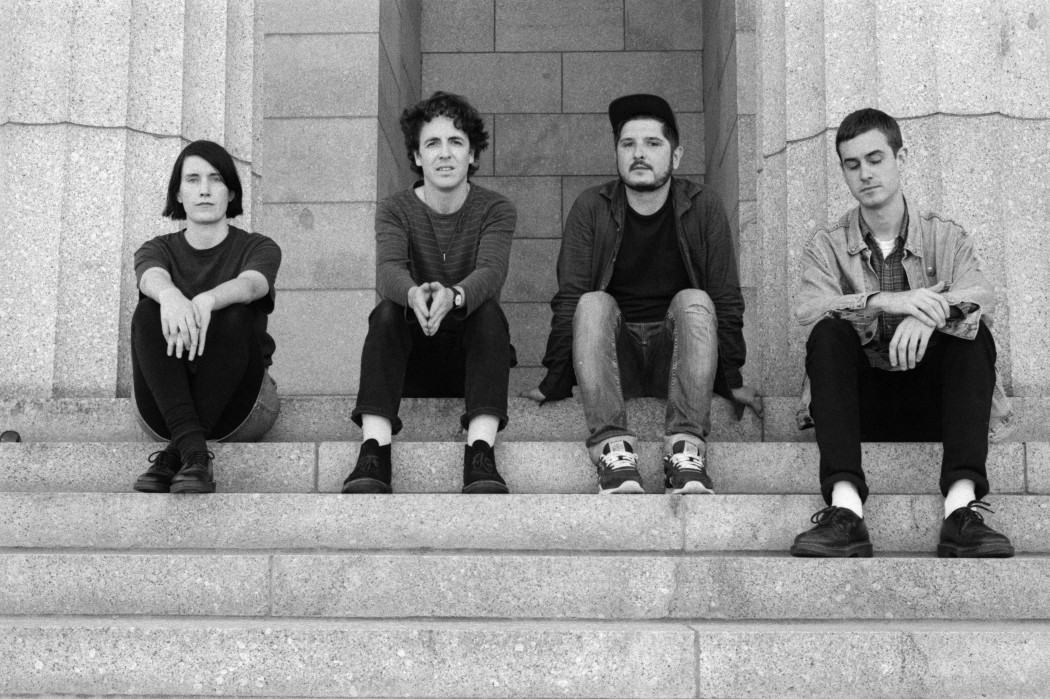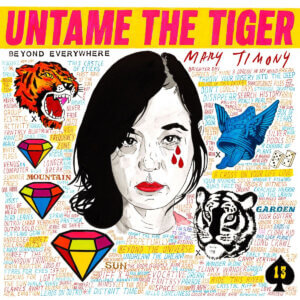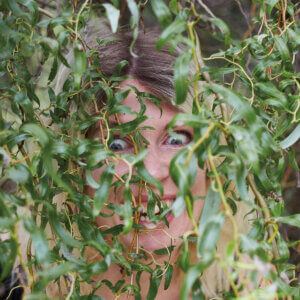Interview With Julia McFarlane from ‘Twerps’

Melbourne foursome Twerps are coming out with a new album, Range Anxiety, on Merge Records on January 27 in the US and February 3 in Europe. There’s a single out already, “Back to You,” with a video directed by Johann Rashid. Formed back in 2008, they’ve worked out a warm sound, filled with longing-laced lyrics pinned against a deceptively bright soundscape of jangly guitars and steady rhythms. The new album wants you to travel beyond the surface of things, and it’s there that the songs sweep you into a world that’s both comfortable and strange. It’s extremely enticing, and it seems pretty certain that this album will see Twerps’ already wide appeal expanding even further. The band are touring the States this spring and making their third trip to SXSW, and Northern Transmissions was able to catch up with Twerps before they start touring Australia. Alice Severin spoke with Julia McFarlane about the new album and the delicate balance of creating with four musicians.
Julia McFarlane: So thanks for doing the interview this morning, Alice.
Northern Transmissions: Is it very early there?
JM: I’ve been up since about seven because I took our dog down to the beach. So I’ve been up for a while, I feel like it’s a perfectly acceptable time to be talking to another hemisphere.
NT: Where are you in Australia?
JM: Martin and I live in Melbourne and we’ve just moved into a new house. It’s towards the Bay area, so sort of on the coast, so it’s very pretty. There’s awesome food around here and a good mix of people. So I’m pretty excited.
NT: Australia is pretty amazing.
JM: Yeah, it’s a great place. I’m actually from New Zealand, so I feel like I have a probably good perspective, coming from like a little brother of a country, New Zealand, which is constantly the butt of jokes in the New Zealand – Australia conversation.
NT: But it’s beautiful.
JM: I think it’s that kind of sibling rivalry. Australia is an older country, and a bigger country, and I think that’s just the way it goes. I forget – until I go home, and every joke is about Australia – ‘an Australian walks into a bar’. It’s much more of a big deal for New Zealanders than it is for Australians now. Australians have gotten over it, but New Zealanders still feeling like a little bit of an underdog, I think.
NT: That’s the kind of thing you never know about until you’re living somewhere.
JM: Yeah, it’s the kind of nuanced relationships that you wouldn’t see from a distance, or they wouldn’t even be advertised.
NT: So, the new album, Range Anxiety, is about to come out. How are you feeling?
JM: Oh, really anxious. (laughs) I’m a pretty anxious person, so I always find something to feel really anxious about, and just feel sick, you know, when I think about the album coming out. How is it going to be received? I wish that that weren’t the case. But I think you do. It wouldn’t be honest of me if I said, ‘I ‘m just happy with making things and I don’t care if people like them’. And this is being released by Merge so I suppose the stakes are a bit higher for us this time. It feels pretty nerve-wracking, but I am very excited for it to finally be out. There’s been like a bit of a wait for it to come out, which how things are when you put out albums.
NT: And it seems like now people expect everything to come out so quickly.
JM: I think that coming from a perspective where we and our friends have ordinarily been able to record cheaply and quickly and just put things out on our own, it feels like it’s a long time to wait when you team up with a group of people who are running a great business, but their mechanism that is in place is kind of going at its own speed and you just sort of have to fit into that. It’s just like letting go. You don’t have complete control over it. You’re not just recording something and releasing it on iTunes.
NT: You’re working with a new company, Merge, releasing you in the States and in Europe.
JM: Yeah, we had our friends Underwater Peoples put out our last album, and before that we had Night People put out our first one, so this is our third American release. But the other ones came out on very small labels. It feels very big for us.
NT: You’re going to be touring here in the spring and going to SXSW. The band has played there before. What are you looking forward to and did you enjoy the experience? You hear different reports of people’s impressions of SXSW.
JM: Yeah, it can be pretty overwhelming. Especially the first time you go there. Some people love being around that many people and that much activity, and some people don’t. I think I’m naturally inclined to feel pretty anxious in that situation and sunburnt and panicky about where we’re going to get food and there’s always so much to do. It feels like a very big job but also very worthwhile at the end, and you go, wow, that was so much fun. For me, I love being able to play that many shows and see so many bands in such a short time. That’s why we’re coming to the States, because it’s fun. I feel like it’s Christmas when you get to see a band that you’ve never seen live before and it’s a new experience. And at SXSW it’s just distilled in Austin over a week. So it’s great, and I love it. I think we’re taking it a bit easy this time. We’ve done it twice before and have done what a million other bands do, which is try to cram as much in as possible. But we’re doing a big tour in the States this time, so we thought maybe we should just do four shows and have a nice time. I think that the party we are most excited about playing is the Panache Party at SXSW. We did that last time. And Michelle puts on a great party and she’s an awesome lady. So I’m looking forward to hanging out with her and seeing the other bands she’s got on.
NT: Twerps formed back in 2008. How did you meet and what do think was the catalyst that made you start the band?
JM: Marty and Rick, they formed the band. They were working in a video store together so they shared a love of cinema and of bands. And then for a long time I think they were talking about doing something and both hadn’t really done anything. Marty, I think, had played in one band before and that’s actually how I met him. But he played back up guitar, and maybe didn’t have much of a creative voice, it was someone’s solo project. And they talked about it for a while, and then finally recorded a couple of songs. You know that song (sings) ‘I’d go the whole wide world, I’d go the whole wide world’ – I think it’s Wreckless Eric. So they did that cover, and they did a couple of songs, one of them was called Little Girls, still one of my favorite songs, and another was, oh what was it called – maybe Nothing about Nothing? So they had a couple of songs on My Space, and I was friends with Marty and Rick already. I knew all those guys just from playing in other bands – Pat and Rick, who were the drummer and bass player, they had been going to shows for years. I played in a really kind of noisy rock band for a long time. And they came to our shows and we just sort of met through the scene. And I had just quit that band, I think I’d been in London, and I came back to Melbourne, just being like ‘thank god I’m back here’ – I wasn’t enjoying London, I wasn’t getting on with the people I was in the band with. And I heard these Twerps recordings, and I think I got in touch with Marty and just asked them if I could join, because I just felt like this was exactly the kind of music I want to be making. And the songs sounded so awesome and it was just – it felt very fresh, I don’t know. It just felt like no one was doing that kind of folk-punk thing, and it just felt really exciting. And they said ‘yeah sure’ and they let me play guitar for them at a rehearsal and we were like ‘yep, this is the band. Cool.’
NT: That’s brilliant – that kind of feeling, that it’s all come together.
JM: Yeah, and those guys, I think had been tinkering around with that idea for ages. I think they just hung out most nights of the week and listened to records together. So Pat, Rick, and Marty had really wanted to do something, and they were like a really tight little threesome and probably idolized some bands from Melbourne, and felt a bit intimidated about doing a band? Like everyone was pretty untrained, you know? It’s not a surprise, like if you listen to our first EP, it sounds very much like that. We’ve gotten a bit better over the years. I think there was a little bit of a ‘oh my god, can we even do a band’? Pat couldn’t play the kick drum when we recorded all of those songs on the first EP. He just used the snare, and like a floor tom, or something. And we’d have conversations like ‘you could just have it in now, you could just use a kick now’ and he’d say ‘yeah, I’m going to do it’ and he wouldn’t do it, because it was just too scary.
NT: It is very hard to coordinate all of that together. People think it’s just like tapping your foot, but it’s not true.
JM: It’s so hard. Yeah, it doesn’t feel like that, because you’re having to think about doing different things at different times, and that’s like one of the hardest things to do, to play drums. I think a good drummer makes it look so easy and you’re like, wow, that’s my instrument, I could do that. Because obviously it’s so much fun, and people make it look so worthwhile, and then you sit behind the kit and you realize how awful it is for other people in the room to just listen to you bash away on a drum kit.
NT: You sit behind the kit and it’s like they get bigger, they’ve expanded.
JM: Yeah, yeah. It’s like all the way over there. And you’re playing the kick drum and the kick drum starts kind of walking away from you, sliding on the floor away from you. I don’t know how often that has happened – maybe like one out of every two shows that happens – to any band, I reckon, where the drummer’s just like – because the instruments are just vibrating away from him or her.
NT: People have described your music as sort of ‘jangle pop’, and on one level it’s very sunny-sounding, but listening to the lyrics, the songs very complex – thoughtful and revealing. How do you balance both sides? Lines like in “Shoulders” – ‘have no fear on my shoulders’ or the mystery in “Fern Murderers”.
JM: I think there’s a lot of anxiety, and kind of longing, in our band. I kind of do get a bit annoyed if someone says, ‘oh look, you’ve got a good review on something’ and I’ll read it, and it will say all of the things that every review has said, like ‘a cool, laid-back slacker breeze pop breezy band from Melbourne making sweet summer jangle tunes’. And I just read it and I feel like, that maybe you just can’t have a perspective when you make something. But I just feel like that it’s so far from the truth, from what it feels like to me. Like the feeling of the band is different to all of those adjectives. Do you know what I mean? I know, like texturally it does make sense. And I suppose a lot of people listen to music and they are doing it in a very kind of sensory way, or like a physical way. But it doesn’t feel like that to me. That’s not the feeling of the band that I get. I just feel like it’s more like kind of sad, or brooding. There’s definitely a lot of jangly moments, I’ll let that happen. But in combination, all of the adjectives used – I think a lot of people just recycle stuff they read in other reviews, and that’s like – there’s a reason for that, I’m sure. There’s obviously so many things that you’ve got to review, you’ve got a hundred things on your desk that you’ve got to talk about and sometimes you’ve just got to use a shorthand that you might have heard before, I’m sure. And, so I don’t know.
NT: Listening to your lyrics, and the way things move together, there are some beautiful harmonies, like on “I Don’t Mind” that seem subtle and painful in a way.
JM: I think that most of the time, if someone is writing a song that works, they just feel like a loser, you know? (laughs) It really does just probably come a lot from that place. So I suppose it’s just always surprising when it’s like ‘some cruise-y laid back summer vibes’. You’re like – oh wow. In a way, it’s neat that people enjoy it like that and you know, probably I should say, in every way people can enjoy it like that. I don’t know, you can’t expect people to interpret things the way you see it.
NT: That’s true. But it’s good to listen more closely to things, and try to really hear what people are trying to say or do.
JM: Yeah, definitely. If I go to a gallery, I’m such a hypocrite, I like to go to a gallery and just look at paintings and just feel things from them or whatever art it is. I suppose if it’s words you expect people to not…it’s got some kind of specificity going on. Someone’s being pretty specific when they’re writing a poem, or maybe not words like poetry. But if there’s language involved, there are already too many signposts for you to just kind of make up your own mind about what you think it’s about. But I know that there’s also a lot of codes and symbolism and things that you can interpret your own way. But I like the idea of people listening a bit closer, I suppose. And that happens after you’ve known an album for longer, I guess.
NT: It seems there is a lot of that in your album. You could just put it on and barbeque and have a beer. But you could also put on headphones and think about it, because there is a kind of poetry to a lot of the songs.
JM: That’s nice of you to say that. We probably only listen to it on headphones, so I hope that people do that. You spend time in a studio making sure that something’s panning from left to right, or there’s a really subtle overdub that you didn’t want to overdo, and you probably have to listen very closely to hear it. I love that about albums and listening to them. Over time, you discover more when you need more to discover. You’re acquainted with the first layer, and then you get to the second layer, and the third layer, and hopefully there’s more to discover than just the first listen.
NT: Absolutely. That’s the hallmark of a really good album, that you can listen to it over and over, and it does have layers.
JM: Yeah. What I love about recording – when you have some kind of restraint on your process, all sorts of interesting things can happen that aren’t entirely obvious, at the time as to what they actually are. You know, if you record in your bedroom a lot, even in the studio where peculiar things can happen, where you’ve got, I don’t know, maybe some phasing or something where two instruments are played at the same time and they end up sounding like one. I love that, those things about recording. Like doing a guitar line and not having it up in the mix so it just sounds weird and surprising when you do hear it. It kind of becomes part of the whole.
NT: What was it like recording this album? Are all of you very involved in the producing, engineering, mixing part of it?
JM: Yeah, we all definitely have a big voice in all of the processes – in writing, and with recording and mixing, and with artwork and everything. So sometimes it’s really difficult. It can feel like such a fragile process. I mean for me, it does. I always feel like if I’m not careful, I’m going to break something – even conversationally, you know – if I’m not careful, I’m definitely going to say something that I will regret in years. And so I feel that when you’re making something, the stakes are kind of high with four people. And you respect those three other people probably more than yourself, but you also respect your own voice. It just feels so scary, trying to figure out the balance of saying what you think needs to happen and also respecting what other people think needs to happen as well. Anyone, I think if they’re writing with four other people, or making art with four other people, or if they’re running a business, like a bar, with four other people, I don’t know, I think in this situation. Like with a band there are so many grey areas. You work with people, it’s such a cliché, I’ve heard so many people say it before – so who’s the boss of who here? Like someone’s paying someone to do something, but it’s not clear who has the authority? And while I don’t necessarily need to buy into that, I think that occurs a lot with music. There are so many vague areas, where there are no rules. It’s must the same in other areas, but in music it feels like anything could happen here, so.
NT: I think music is so immediate, that’s part of its appeal. Not knowing what will happen.
JM: Totally, yeah. I feel like everything I do is like that. As soon as you add other people into the mix you have to…I think it’s hard being stubborn as well. I think we’re all pretty stubborn. Because like Marty will write most of the songs, or like he sings most of the songs, but we both sing songs, and we’re in a relationship, so, we have a very complicated relationship where we have to make sure that we’re respecting the other person and that we’re respecting the thing that we’re doing and that we’re respecting the other people in the room and we’re respecting ourselves.
NT: I wanted to ask you about “Empty Road.” How did that one come about?
JM: “Empty Road,” I think we were aiming to make a song that sounded like the Television Personalities, actually. And it doesn’t sound like that. But you know, you have like a starting point. Marty said actually that the song is about him following Dan Treacy, imagining that he was following him on the way home. Do you know them? They’re an English band, and probably the most agreed upon influence for Twerps. Reviews say that the Twerps love The Clean and The Go-Betweens, and we do, but we said that about six or seven years ago. So “Empty Road” is about Marty imagining following the singer of Television Personalities, or TVP as people like to call them, and he’s basically stalking him. And he’s watching him be sick. He’s like a renowned – good time guy, I’ll say that – I think Marty’s imagined that he’s had a few too many to drink or something, and he’s following his idol home and just watching him. And it’s very creepy. I think the first time Ben and Guy heard it, from Chapter, our label in Melbourne, they were concerned. I think Ben said, ‘I’m a little worried about “Empty Road” – you’re following a girl home, or something? And nobody knows what it’s about, so I’m sure people will say that about it. And we just had a new member join the band, Alex, when we were writing all of those songs. A lot of those songs, it’s such a neat document for me, because I feel like listening to that album, definitely everyone was trying to find their feet, how to jam together. Because Twerps has always been a very collaborative group, and we had a particular way of making songs with our previous line-up. So it feels like – it’s not like someone can just come in and everything’s the same. We needed to respect all the places that Alex is coming from and find a new voice. And I think maybe “Empty Road” was one of those songs where it’s the most obvious. Some of the songs came about from us just mucking around, and some Marty had running around in his head before he brought it to practice.
NT: Do you ever have songs that he brings, and once you start playing them everything changes?
JM: Well, yeah. I think it’s easy to do that. I think drums and guitar can do so much to change the mood of a song. So I feel like that probably happens all the time, with Marty writing or singing the bulk of the songs. I’m not sure, I’m pretty sure he probably feels like that – ‘these songs were just going to be simple country songs’. And they came out like this. Marty might have a more traditional line of sight than us, and that’s why a lot of the time it feels really fun. It feels like a fun way to jam. Marty’s really good at collaborating and improvising, so he’s really pretty free and easy about where the songs can go, which is awesome for us. And I feel like a bit of an immovable, rusty cog in comparison. Like I’ll have an idea how a song is going to go, and I’m not entirely confident enough to jam out an idea, I’ll feel that it has to be more done or something before I show people. But Marty is a lot more confident. He’ll often just be happy to play a pretty fresh idea that doesn’t have a lot of parts worked out.
NT: That sounds like a great way of working.
JM: Yeah, he loves it. He loves that process and loves improvising in the studio. I like improvising but I don’t like doing it with singing. Singing in front of other people is scary enough as it is. (laughs) So maybe his songs are more collaborative. He’s a bit more generous than I am.
NT: It sounds like you all have this brilliant understanding of how to work together and willingness to make it work.
JM: Yeah, it’s never been a situation where it’s one or two songwriters and other people who play the music. You really have to listen to everybody, and it really relies so much on everybody else’s input. Marty and I couldn’t record at home and have it sound like Twerps. It has to have that spirit and rely on other people.
NT: And five albums that still inspire you.
JM: Me personally? I won’t speak on behalf of them, while we agree on so much, there’s definitely worlds of music taste that don’t cross over. Marty is really up on contemporary stuff, so he’s really into Cass McCombs and he has a really good knowledge of everything historical. I might listen to more introspective stuff, and Alex – plays in a grindcore band as well, so he’s really into metal. He’s really into everything. So five albums, I’ll speak for myself.
John Cale – Paris 1919
The Raincoats – Moving
The Puddle – Into the Moon
Lou Reed – Coney Island Baby
Panel of Judges – Bad Vibrations
Latest Reviews
Tracks
Advertisement
Looking for something new to listen to?
Sign up to our all-new newsletter for top-notch reviews, news, videos and playlists.









